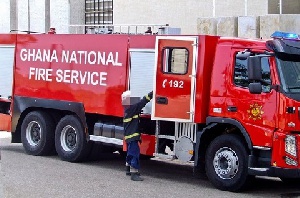 The Ghana National Fire Service (GNFS)
The Ghana National Fire Service (GNFS)
The Ghana National Fire Service (GNFS) has observed with much concern the constant accusation by a section of the public especially some victims of fire outbreaks and members of the public who may not have an adequate understanding of our mode of operation.
This perception has persisted for a while and we, therefore, deem it necessary to set the records straight to save our hard-won reputation.
1. Every fire tender at the station including the broken down tenders have water in them and therefore, serviceable tenders always move to the fire scene with water.
2. The fire tender does not carry only water. There are other compartments that contain, hoses, firefighting equipment and tools as well as Road Traffic Collusion extrication equipment and other Rescue equipment for emergency operations.
3. There is a compartment for water that contains 3,000litres or 4,000 liters of water for firefighting which can be dispensed within a period of eight (8) minutes depending on the intensity of the fire being dealt with.
4. We therefore, augment the inadequate water by requesting other tenders to come and assist by supplying water to the base pump (first appliance to arrive at the fire scene) to fight the fire. Other water tankers also come in to support in that respect.
5. Our system is different from other jurisdictions where you can find fire hydrants every 100 meters which makes it easier to have regular access to water for continuous firefighting.
6. When a fire tender gets to a particular fire ground with electricity suspected as the cause, the electricity company (ECG) is immediately contacted to cut off power supply before effective firefighting commences. Some members of the public however quickly attributes this period of waiting to the GNFS not bringing water to the fire scene, water getting finished from the fire appliance or firemen being confused and waiting for the fire to calm down by itself. When water is splashed on adjourning structures to check the spread of fire, some members of the public become displeased and as a result attack and abuse firefighters.
7. When a firefighter is at work, his/ her safety is paramount and should adhere to safety methods that will protect his or her life and that of others.
The Chief Fire Officer has also issued a directive that fire fighters should call for assistance even before the first pump runs out of water.
Management wishes to reiterate that, the Ghana National Fire Service will continue to play its role as the mother of all firefighting units in the Country on whose support they fall on for assistance, therefore the relevance of the Ghana National Fire Service in the socio economic development of the country has never been in doubt.
Firemen are trained professionals who have undergone the rudiments of firefighting operations with some benefitting from training packages abroad; therefore no one can do the work better than the professionals.
We wish to call on the Public and the media to do inquiries on aspects of our operations that may not be clear to them. We shall also continue to educate the masses in this respect.
Management urges the Public to call the Ghana National Fire Service promptly during fire outbreaks and other emergency situations on 112/192 for necessary assistance.